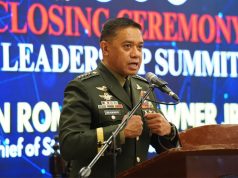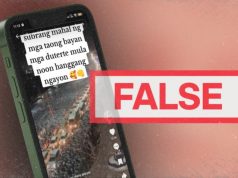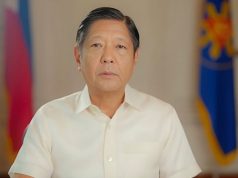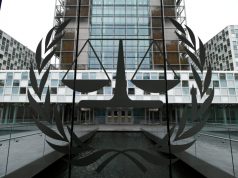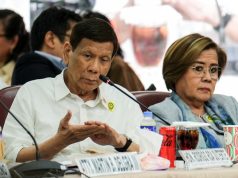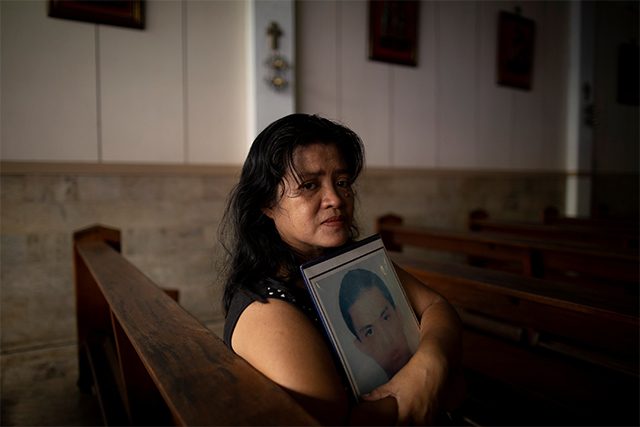
Activists and the families of victims in a drug war that has killed thousands view with dread the possibility of President Rodrigo Duterte staying on as vice-president for six more years after his time in the top job ends next year.
The constitution bars a re-election bid by Duterte, 76, but he said on Tuesday he would run for vice president in 2022 in order to keep up his crusade on insurgency, criminal activities and drug dealers.
“For four years, we have been waiting for justice,” said Randy Delos Santos, who believes that if Duterte succeeds it would make justice even more elusive for families such as his that have lost a member to the anti-drug campaign.
“For four years, we have been living in fear,” added Delos Santos, who worries about the prospect of reprisals after the August 2017 killing of his nephew, high school student Kian, led to the first convictions of police officers in the drug war.
Since Duterte unleashed the drugs crackdown in 2016, Philippine security forces say they have killed 6,165 suspected drug dealers because they fought back violently, but rights groups say authorities have summarily executed them.
Three police officers convicted of murder in the killing have said they shot Kian Delos Santos in self-defense, and appealed to a higher court.
The death features in a report by the prosecutor of the International Criminal Court (ICC), who seeks to launch a full inquiry into the drug war killings.
Duterte has accused the ICC of prejudice against him, cancelling the Philippines’ membership of the body in March 2018, just weeks after the prosecutor said the preliminary examination had begun, and later dared it to put him on trial.
“I have never denied, and the ICC can record it: those who destroy my country, I will kill you,” he said in a state of the nation address last month.
Cabinet secretary Karlo Nograles, who belongs to Duterte‘s ruling PDP-Laban party, has said his becoming vice president would guarantee continuation of the government’s programmes, including the war on drugs.
Spirit of the law
The possibility that Duterte could stay in an executive post beyond 2022 shows that “domestic mechanisms for accountability will not work for obtaining justice,” said Cristina Palabay of human rights group Karapatan.
While Duterte is legally allowed to run for vice president, doing so “violates the spirit of the law” which set a term limit to prevent abuse of power, said law professor Antonio La Viña of the capital’s Ateneo de Manila university.
Duterte‘s critics believe the prospect of losing immunity after the end of his term makes him keen to run for vice-president as a shield against any legal action.
“This is driven by fear of accountability, both from the ICC and from our own justice system,” said 1Sambayan, a grouping of opposition figures that includes a staunch Duterte critic, former Supreme Court Justice Antonio Carpio.
Lawyer Kristina Conti, who represents some victims’ families, fears the killings will continue if Duterte stays on.
On Wednesday, Duterte‘s spokesperson, Harry Roque, said the plan for a vice-presidential bid had not been finalised and would not be pursued if the president’s daughter, Sara Duterte-Carpio, now mayor of the family’s southern stronghold of Davao City, were to seek the presidency.
“The president said if Mayor Sara Duterte is running for president, he is out, so is Senator Bong Go,” Roque told reporters, referring to Senator Christopher “Bong” Go, Duterte‘s aide and chosen successor.
Sara Duterte, who is ahead of the senator in opinion polls, did not immediately respond to queries about her plans for the race in 2022. She has previously said she was not interested. https://www.reuters.com/world/asia-pacific/run-sara-run-is-dutertes-daughter-playing-her-fathers-game-2021-04-15
Justice Minister Menardo Guevarra urged people to keep faith with the justice system.
“President Duterte has never said that law enforcement agents who have overstepped the bounds of the law in the performance of their duties will go scot-free,” he told Reuters.
“Our justice system, while not perfect with all the institutional challenges confronting it, continues to work.”-Reporting by Karen Lema; Editing by Clarence Fernandez




